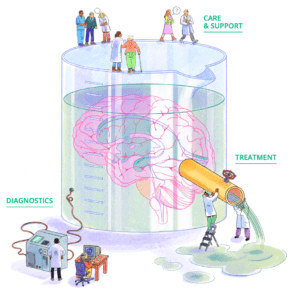What is normal pressure hydrocephalus?
Normal pressure hydrocephalus, or NPH, is a condition that affects the drainage of cerebrospinal fluid (CSF) around the brain. This means too much CSF builds up inside the brain’s ventricles (fluid-filled spaces). The condition mainly affects older people and symptoms can include:
- Problems with walking
- Memory loss and cognitive impairment (difficulties with thinking)
- Loss of bladder control
How is NPH diagnosed?
Normal pressure hydrocephalus can be misdiagnosed as Alzheimer’s disease or other neurological conditions due to similar symptoms. Currently, the following tests may be used to diagnose NPH:
- Gait (walking) tests
- Cognitive assessment
- Brain imaging (MRI or CT scan)
- Lumbar puncture, drainage and/or infusion tests
REVERT involves sharing best practice among the project partners and exploring new ways of improving diagnostic accuracy.

How is NPH treated?
The symptoms of NPH can potentially be reversed by shunt surgery. In this procedure, a neurosurgeon implants a small, thin tube with a valve (the shunt) into the brain to drain the excess cerebrospinal fluid into another part of the body, usually the abdomen.
To learn more about normal pressure hydrocephalus, you may find the following pages helpful.
In English
SHINE charity webpage about hydrocephalus
NHS webpage on the different types of hydrocephalus
Hydrocephalus Association webpage on normal pressure hydrocephalus
In French
Association Tête en l’air page about hydrocephalus
Société Alzheimer du Canada page about normal pressure hydrocephalus
Association Apaiser webpage
